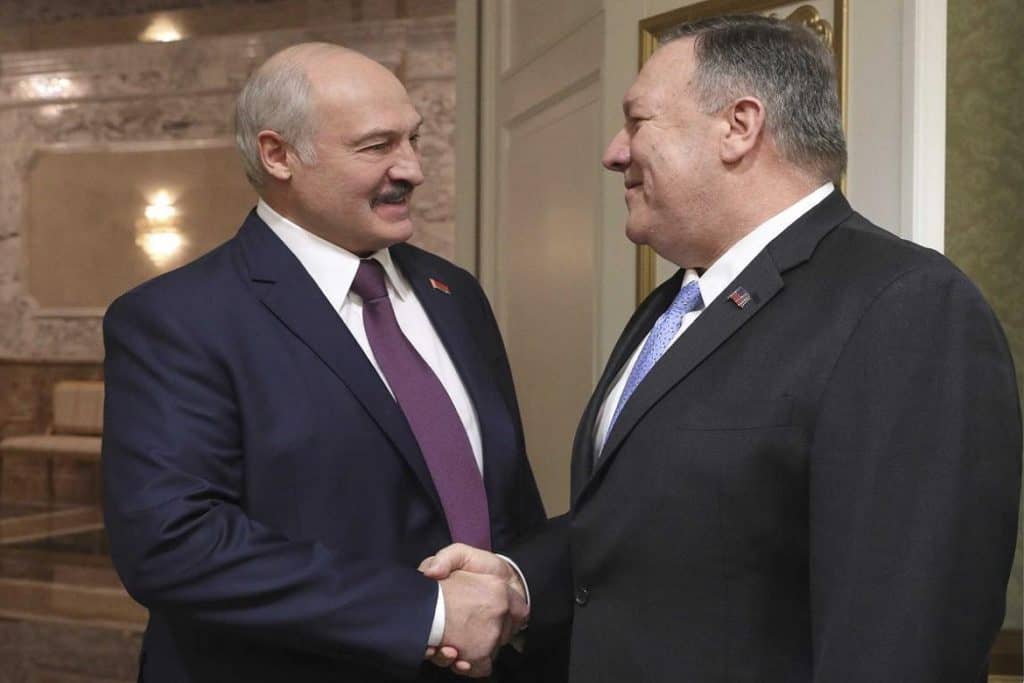By Denis Korkodinov
The visits of US Secretary of State Mike Pompeo to Belarus and Kazakhstan confirm the Washington’s plans to bring down the Eurasian Economic Union, whose member countries have begun the process of Russia’s rejection. The guarantees for the development of the “Western vector,” which Moscow and Beijing allegedly threaten, have become the main motive for the activation of centrifugal trends.
Apparently, Alexander Lukashenko seems to become the first to drive the first nail into the lid of the EAEU coffin under pressure from the White House administration.
Washington at the beginning of the negotiation process with Minsk can promise much more than it can fulfill. In this regard, there is a huge gap between American promises and their actual fulfillment. For this reason, the statements of the US Foreign Minister on military and economic assistance to Belarus “100 percent”, the resumption of close diplomatic cooperation are unlikely to be implemented in the foreseeable future.
In addition, Mike Pompeo’s statements about Minsk and Nur-Sultan should not be taken seriously for several reasons. First of all, Donald Trump, most likely, did not give his consent to fulfill the promises of the US Secretary of State. Confirmation of this thesis is that Washington’s anti-Russian policy has recently been defined as a factor of pressure on the head of the White House amid an attempt to impeach him. At the same time, Donald Trump was not inclined, through his Twitter messages, to sharply criticize Moscow’s position and publicly promise something to its closest neighbors.
Therefore, Mike Pompeo, speaking in Minsk and Nur Sultan, most likely acted on his own initiative. And in order for the promises that were made to Alexander Lukashenko and Kasym-Zhomart Tokayev to be a reality, it is necessary, first of all, the will of the head of the American state. But until this happened, Mike Pompeo’s visit to Belarus and Kazakhstan was fact-finding and optional.
Among other things, a significant obstacle to the implementation of the promises of the US Secretary of State is the position of the European Union. Despite the fact that some members of the White House administration are striving to sharply aggravate relations with Moscow, German Chancellor Angela Merkel and French President Emmanuel Macron are looking for an opportunity to establish a constructive dialogue with Vladimir Putin. On this basis, leading European players amid statements by Mike Pompeo are likely to help strengthen the influence of opponents Alexander Lukashenko and Kasym-Zhomart Tokayev in order to upset their plans for an alliance with the United States.
There is no consensus in Washington regarding the need to compete with Russia in the post-Soviet space, since the Middle East and Central Asia remain the priority foreign policy for the White House administration. Donald Trump understands that the United States cannot afford to escalate conflicts in three directions at the same time, since the strengthening of American positions against Russia in the countries of the former USSR will force it to weaken its positions in the Middle East and Central Asia.
As a result of this, Washington risks facing a sharp increase in anti-American protests, especially in Syria, Iraq, Iran, Lebanon, Yemen and Afghanistan. This will finally undermine the confidence in Donald Trump from his Arab partners and will lead to the complete withdrawal of the United States from the region.
It is worth noting that American congressmen are also not unanimous in the opinion that Washington should sharply reorient itself toward “eliminating the Russian threat.” For this reason, the post-Soviet space and the Asia-Pacific region for the White House administration do not yet represent a priority foreign policy, based on the fact that here the United States currently faces a minimum of problems compared to what the United States has to face in the Middle East and in latin america.
Of course, Washington still treats Moscow and Beijing with some concern. However, the currently existing instruments of American influence on these capitals are quite enough to continue to keep abreast. Therefore, Russia and China do not require additional attention from the United States.
Thus, the visit of Mike Pompeo to Belarus and Kazakhstan is just an excuse for Minsk and Nur-Sultan to feel like American favorites on the border with Russia. Nevertheless, while Donald Trump did not express his clear position regarding the need to involve these countries in the orbit of the interests of the White House.
(The views expressed in this article belong only to the author and do not necessarily reflect the views of World Geostrategic Insights).







